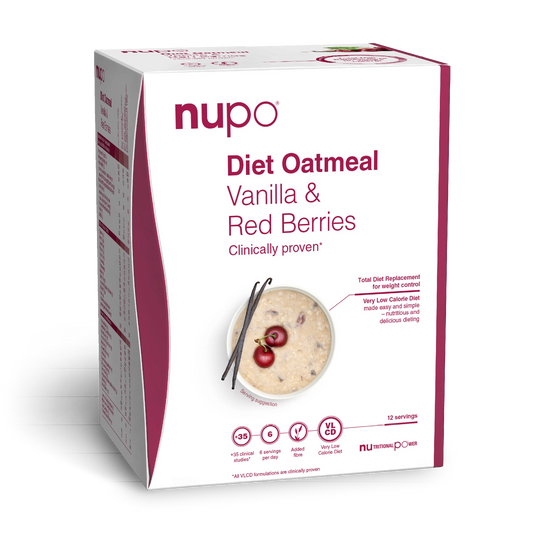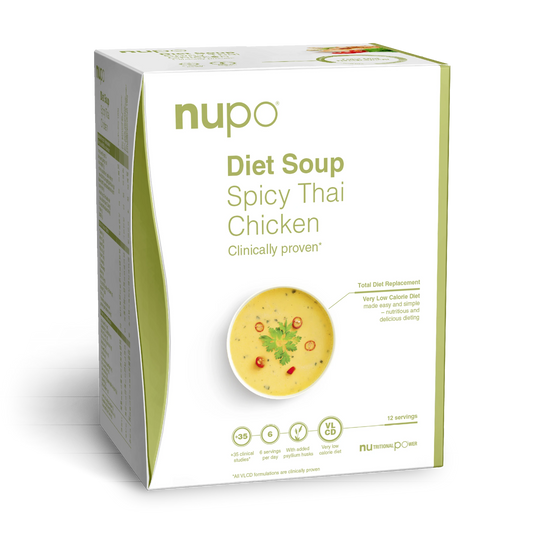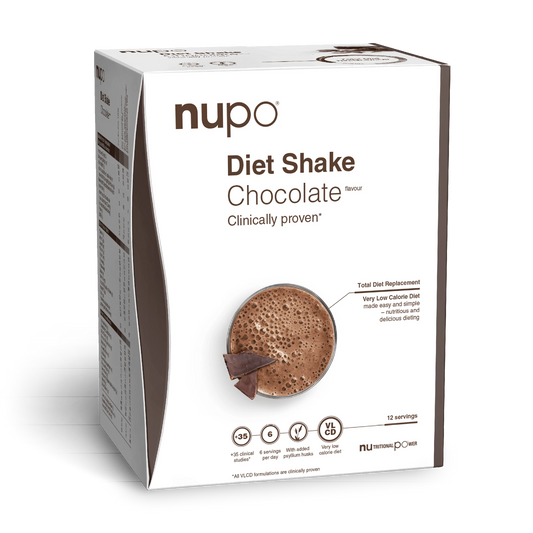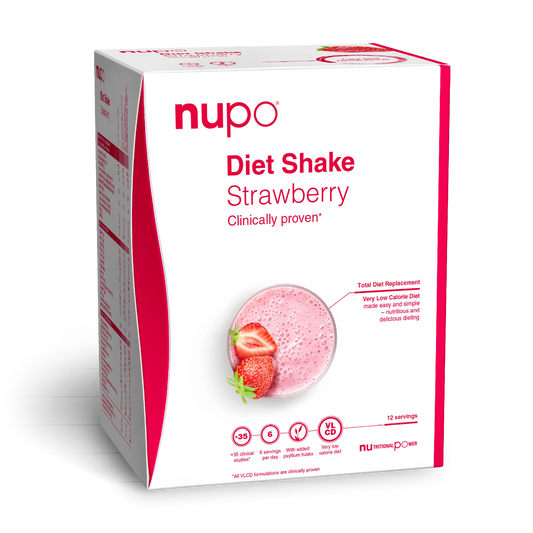Meal replacement shakes are everywhere – but do they really help with weight loss? In Episode 2 of 10 Minutes to Change, we explore when shakes are effective and when they’re not.
A good meal replacement shake is more than just protein – it contains the right balance of carbs, fats, vitamins and minerals to fully replace a meal. We discuss how to choose the right shake, when to drink it, and what to avoid (like skipping meals or relying on shakes alone). If you're using the Nupo Diet or following an 800 calorie plan, this episode is packed with tips.
🎧 Tap to listen and make your next shake a smarter one.
Welcome to 10 Minutes to Change, small steps, big results. In each short episode, we tackle everyday challenges, share practical tips, and explore science-based insights to help you build a clear and balanced lifestyle. Today, we're diving into how you can simplify nutrition without cutting corners. From busy mornings to post-workout recovery, discover how meal replacement shakes fit into real life with complete on-the-go nutrition. Explore what makes them stand out and how they could fit into your day. Let's dive in.
Have you ever found yourself maybe standing in the grocery aisle, just looking at shelves packed with healthy, quick, convenient stuff and feeling, well, completely overwhelmed?
Oh, absolutely. It's a lot.
Or maybe your day is just this crazy whirlwind, right? Work, family, trying to maybe get some exercise in, and the idea of cooking a proper, nutritious meal feels almost impossible.
It's a classic modern problem, isn't it?
It really is. So many choices, but, like, so little time to figure out what's actually good for you, especially if you're not already, you know, deep into nutrition and calories.
And right there, you've probably seen them, meal replacement shakes, but how do we make sense of it all? Are they genuinely good or just another trend?
That's exactly why we're doing this deep dive today. Our mission really is to cut through that confusion.
Especially with all these liquid nutrition options.
And for anyone who feels maybe a bit lost with terms like macronutrients or calorie deficit, we want to break down the real differences. What's a complete meal in a bottle versus just, say, a protein boost? Because understanding that is, well, it's crucial, not just for hitting health goals, but making sure your body actually gets what it needs to function well, even if you're just starting to learn about nutrition basics.
Exactly. So our goal here is to really unpack this whole world of meal replacement shakes. What's actually in them? How do they fit into a busy life or maybe help with weight management?
And the big one.
And the big one, yeah. How are they fundamentally different from all those other drinks you see everywhere? Okay, let's explore this.
Let's do it.
So starting right at the beginning. What exactly is a meal replacement shake? Because it's definitely not just any old drink you grab off the shelf.
Right.
The sources we looked at call them a comprehensive nutritional solution in a convenient bottle. Essentially, think of it as a full balanced meal, but, you know, liquid, ready to drink.
That's a pretty bold claim, isn't it? A full meal in a shake.
It really is.
And that's precisely where the key difference lies, especially if nutrition labels sometimes feel like a foreign language. Unlike your standard protein shake, which, I mean, the name says it all, it's mostly about protein. A true meal replacement gives you complete nutrition.
Okay, complete nutrition. What does that actually mean in practice?
Well, think of it like building a house. Protein is like the walls, the frame, super important, obviously.
Sure.
But you also need the wiring, the plumbing, the insulation.
Mm-hmm.
A solid foundation, right?
Yeah.
Otherwise it's just a shell.
Mm-hmm.
So complete nutrition means the shake is designed to give you that balanced mix. Yes, protein, but also healthy fats, fiber, and all the essential vitamins and minerals your body needs. It's about nourishing you completely, almost like you sat down to a well planned plate of food.
That makes a lot more sense. So if we look at a typical ready-to-drink RTD, you see that a lot, meal replacement, like the Nupo ones mentioned in our sources, they're usually around 200 calories.
Yep, typically in that range.
And they're always flagged as being high in protein and sugar free. Those seem to be key selling points.
Exactly. And what's fascinating here is why those things matter so much for your body, particularly if you're trying to be mindful.
Go on.
So the high protein—it's not just for muscles, though it definitely helps there. Protein is also really key for keeping your energy levels steady. No big slumps.
Okay.
And maybe the biggest thing is it promotes satiety. That's just a technical term for feeling fuller longer, which is a huge help if you're watching calories, but don't want to feel hungry all the time.
Right, that feeling full part is crucial.
Totally. Then there's the sugar-free aspect. That's vital for avoiding those energy crashes you get from sugary drinks. It helps keep your blood sugar stable.
Ah, okay. No sugar rush, no crash.
Precisely. And finally, all those essential vitamins and minerals, that means these aren't just about the big stuff, protein, fats. They cover the micronutrients too, the tiny things that are absolutely crucial for, well, everything, your immune system, metabolism, just optimal body function day-to-day.
So it's really covering all the bases.
That's the goal of a true meal replacement, yes, which, um, brings up a really important point actually.
It's that.
With so many shakes out there, who actually decides what gets to be called a meal replacement? You'd think anyone could just slap a label on.
Yeah, you would. Is there any standard?
Well, in many places, particularly like the EU, there are incredibly strict science-based standards for what goes into these products.
Mm-hmm.
It's not just marketing fluff, it's regulated for consumer protection.
Oh, interesting. So we're talking specific rules, not just general ideas.
Very specific.
Hm.
Far beyond just guidelines. They regulate everything. The total energy content per meal usually has to be between 200 and 250 calories.
Wow, that precise?
Yep. And the exact ratios of the macronutrients, protein, fat, carbs. For fat, for instance, they don't just cap the total amount, they actually require minimum levels of essential fatty acids like linoleic acid.
Ah, didn't know that.
Protein also has to make up a specific percentage range of the total energy. And maybe the most important part, they have to provide at least 30% of the nutrient reference values, the NRVs, for most essential vitamins and minerals per meal.
NRVs, those are like the daily recommended amounts.
Exactly. The official benchmarks for what the average adult needs. So it guarantees a truly complete and balanced profile, not just say a ton of protein and nothing else.
So what does this all mean for, you know, for you listening and trying to figure this out?
Well, the real takeaway isn't just that there are rules.
Right.
It's that these strict guidelines essentially weed out products making big claims, but maybe not delivering nutritionally. It's a safeguard. It means when you pick up something labeled meal replacement that meets these standards, you know you're getting a verified comprehensive nutritional package.
That actually gives you quite a bit of confidence then. You're not just guessing based on the front of the bottle.
Exactly. It takes some of the guesswork out.
Okay. Let's tackle something that I think trips a lot of people up. You hear shake, you often just think protein shake.
Mm-hmm. Very common confusion.
But you're saying there's a really important difference here, one that could seriously affect your health goals if you mix them up.
Absolutely. This is probably one of the most critical distinctions we need to make clear. Protein drinks, well, they do what they say on the tin.
Yeah.
Deliver protein.
Okay.
But they can be all over the place otherwise. Different sizes, different calorie counts, varying amounts of sugar or fat. You might see 10 grams of protein, you might see 28.
Right.
And crucially, they are not held to those same strict governmental standards for being nutritionally complete like meal replacements are. They might be great for protein, sure, but they often lack enough carbs, healthy fats, fiber, or that full range of vitamins and minerals.
So they're kind of a one-trick pony, nutritionally speaking?
You could say that in comparison to a meal replacement. Now the meal replacement RTDs, the ready to drinks, they're specifically designed to be a whole meal.
Yeah.
They have that balanced blend, proteins, carbs, fats, vitamins, minerals, all meeting those strict standards we talked about.
Okay.
So connecting this to the bigger picture, if you regularly swap meals for just a typical protein drink, you could run into problems. Your calorie intake might be off too low, maybe even too high for your goals.
Hmm.
And maybe more importantly, long term, you could miss out on vital nutrients your body needs to function properly.
Hmm.
It's really about using the right tool for the right job.
Right. That's the aha moment, isn't it? A protein shake. Maybe great after the gym for muscle recovery. It has its place.
For sure.
But it's just not designed to be your lunch, to provide everything you need like a proper m- meal replacement is. Understanding that difference feels like a real game changer for making smarter choices.
It really can be.
Okay. So we get what they are, how they're regulated, how they differ from protein shakes. Let's talk practical benefits. These things are designed for convenience, right? Like a serious convenience.
Absolutely. Convenience without compromise is the idea.
No mixing powders, no blender to clean, no prep time at all. Just twist the cap. It's incredibly simple. A lifesaver for busy days.
And that simplicity makes them fantastic in so many situations.
Yeah.
On the go nutrition, perfect. Busy professionals, parents running around, fitness folks needing something quick post-workout.
Yeah, you can just keep one in your bag or car.
Exactly, or your desk drawer. Instant access when hunger hits, or when healthy options just aren't around.
And what about weight management? That comes up a lot.
Big area, yes.
Yeah.
Because the calorie count is precise and regulated, it makes tracking intake much, much simpler. No weighing, no guessing. It's right there.
Okay.
Plus they're designed to be filling, even though they're usually lower in calories than, say, a typical lunch or dinner. That helps you feel satisfied while consuming less overall.
So replacing one or two meals a day could genuinely help reduce total calories.
It can, yes.
Yeah.
While crucially still providing all that essential nutrition, so it supports weight loss in a, well, in a nutritionally sound way.
Makes sense. Any other key uses?
Well, post-workout, that high protein content is great for muscle repair.
Right.
And managing sugar cravings. This is an interesting one, because they come in tasty flavors. You mentioned chocolate bliss, strawberry love, vanilla banana.
Mm, cafe latte happiness sounds good too.
Right. They can genuinely satisfy that sweet tooth. And because they're filling and balanced, you're less likely to then go and overeat something else afterwards. It's a satisfying and smart choice.
That's amazing flexibility. It means you could replace, say, breakfast and lunch, but still have a normal dinner with family or friends.
Exactly. It fits into your life rather than forcing your life to revolve around a super strict diet.
Right.
Much more sustainable long term for most people.
Definitely.
But it's really important to stress, while they're convenient and complete, meal replacements are a tool.
Okay, yeah, good point.
They need to be part of a bigger picture, a balanced diet overall, a healthy routine, getting enough water. They aren't a magic bullet for weight loss on their own. They support the process.
A tool, not a magic bullet. I like that. So given they're a tool, are there guidelines, like who shouldn't maybe use these, or are things people need to keep in mind?
Yes, absolutely. The sources are clear. They're safe for daily use. They meet those UK and EU guidelines we discussed.
Okay.
But their main intended use is for healthy, overweight, or obese adults who intend to achieve weight reduction.
Right, so targeted.
Very targeted.
So it really comes back to this not being a quick fix. It's about making smart, informed choices to support your health overall, using these products wisely.
Precisely.
Yeah.
Within a healthy framework that works for you.
Okay, so let's try and wrap this up. The core takeaway today seems to be meal replacement shakes. They're a specific highly regulated category.
Hmm.
Very different from just a protein shake. They're designed to be a complete meal, nutritionally speaking, while also making calorie management easier for busy people or those aiming for weight goals.
Yep, that's the essence.
And the key is really understanding what's in them, thanks to those regulations, and knowing how to fit them smartly and safely into your healthy lifestyle.
Couldn't have said it better. Knowledge really does empower you to make better choices for your own body, whether the goal is weight loss, maintaining weight, or just needing a genuinely nutritious, convenient option on those crazy days.
Yeah.
Knowing the difference between a properly formulated complete meal replacement and other shakes, it's essential. It ensures you're giving your body what it truly needs.
Right.
Hmm.
So given everything we've unpacked today, especially how carefully these meal replacement shakes are actually put together perhaps the next time you're reaching for something quick and nutritious—
Mm-hmm.
... you'll think beyond just the calorie number. You'll think about that whole symphony of nutrients your body needs to really truly thrive.
Thanks for listening to 10 Minutes to Change: small steps, big results, where health meets simplicity. Visit nupo.co.uk for inspiration, support, and smart nutrition made for real life. Until next time, take care of you.














